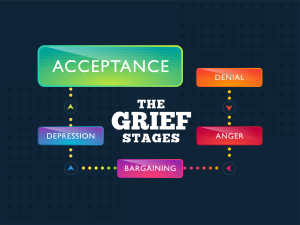Section 2: Family Life
15 Reacting to a Diagnosis
When an individual receives a major diagnosis, he or she may go through the well-studied five stages of adjustment (Kubler-Ross, 1969[1]). When the diagnosis is given to a person, their caregivers often also go through those five stages.

Whatever reactions you do feel are perfectly fine and acceptable. Think of a diagnosis as a starting point and acceptance as your destination; whatever road you take to reach your destination is okay. There are an endless number of routes you can take to reach your destination, and any one of them will get you there. You will simply take the route that works best for you. Not everyone will progress through stages in the same order or pace—that is ok. The five stages listed below represent one commonly taken route, but certainly not the only one; support each other through these stages with the realization that it is common to revisit the stages when various life events (e.g., birthdays, graduations, marriages) occur.
1. Denial
Many parents may try to deny their child’s diagnosis immediately after hearing it. They may believe there has been a mistake; they may believe that their child will outgrow the diagnosis, or they may simply think they must be having a bad dream. Learning your child has an autism spectrum disorder diagnosis can be overwhelming and it is very common to believe that there is no way the diagnosis could be accurate. It may be easier to go home after hearing the diagnosis and pretend like it did not happen, to avoid telling anyone what you’ve learned, or to simply hope it will all go away. All of these reactions are typical of the denial stage. However, as time passes, it may become harder and harder to deny the existence of your child’s difficulties. As you start to realize that the diagnosis is accurate you may move on to the next stage…
2. Anger
You may begin to think it is unfair your child has this problem when other children do not. You may look at people who failed to take good care of themselves while pregnant and be angry that their child turned out fine while yours has difficulties. Some parents will watch their child struggle with tasks that come easily to other children, and it feels unfair. These reactions are typical of the anger stage. You simply cannot understand why this happened, and you wish you could make it all go away. As you begin to work through this stage you may start to move on to the next stage…
3. Bargaining
Parents in the bargaining stage try to work out ways to fix their child. They may have thoughts such as, “If I am the perfect parent and do X, Y, and Z, then my child will be cured.” They may say prayers in which they promise to never do another bad thing in their life if God will cure their child. While in the bargaining stage, parents try to find ways to exchange their behaviors for the complete recovery of their children. As they begin to realize that nothing will completely cure their child, parents may move on to the next stage…
4. Depression
Once they realize that the diagnosis is accurate and that they cannot bargain their way out of it, parents may feel depressed. Parents in the depression stage may feel sadness that their child cannot be cured. They may feel upset that they cannot do anything to make the situation different. While in this stage, parents may feel like the rest of their life will be focused on helping this child and may feel overwhelmed or hopeless. Eventually, parents in this stage will discover what works best for their child and create routines that work for them and their family. Once these realizations begin to occur, the parent has moved into the final stage…
5. Acceptance
Parents in the final stage, acceptance, have generally worked through all of their emotional reactions to their child’s diagnosis. They understand that their child is just as wonderful, sweet, lovable, and precious as before the diagnosis. They know that they can handle raising their child and have generally sought out whatever additional supports they will require. Parents in the final stage know that although their child may never be cured, they can show improvements and learn many new skills. They know that although their child may not be perfect, no child is perfect. They have learned to accept their child for who he or she may be.
- Kubler-Ross, E. (1969). On Death and Dying. New York: MacMillian Publishing Company. ↵
